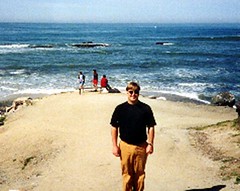I spent the 2004 Thanskgiving weekend in Fairhope, AL on Mobile Bay's Eastern Shore. As the name suggests, Fairhope is a late 19th century Utopian community, in this case based on the single land tax philosophy of Henry George. Founded in 1894 on bluffs overlooking Mobile Bay, Fairhope became a city in 1908, and to this day, the Single Tax Colony has a beautiful set of waterfront parks, bluffs above the waterfront, and a municipal pier, all belonging to the citizenry of Fairhope. The Henry George Park boasts an insane three-sided obelisk with quotes about Labor, Capital, and Land. This is not your mammy's 'Bama. Fairhope was also the home to the innovative educational techniques of Marietta Johnson, including the 1907 organic, non-graded, uncompetitive school based on the progressive ideas of John Dewey. In fact, Fairhope is America's longest-surviving secular "utopian" community set up to promote social and economic reform.
Today Fairhope is a European village in a Southern setting with a growing artists' colony of painters, sculptors, and authors. Central to the latter are Martin Lanaux's Over the Transom Books and Sonny Brewer's Blue Moon Cafe stories collections. The most recent volume in this series includes a tale by my good friend Brad Vice. Fairhope also has an annual artist's fair, the "Grand Festival by the Bay": here's a photolog of my friend Susan Ford's triumphant 2002 appearance.
For my West Coast readers, think the shopping districts of Menlo Park or Los Altos deposited on an East-West axis leading down a hill to high bluffs above a medium-sized bay held up by award-winning Swamp Tupelo and topped by Magnolias, scrub Pine, and majestic Live Oaks draped with Spanish Moss. The buildings run the gamut from Key West cool to traditional Mediterannean villas to classical Southern Coastal (think the big white houses with wrap-around porches in The Big Chill and Forrest Gump). I guess the reason I like Fairhope so much is because it reminds of home, in this case the older ante-bellum parts of Tallahassee that preserve a slower, more gracious lifestyle in their neoclassical piles, but a heritage that was even in the mid 1960s already "residual," in the terminology of Raymond Williams. I also think Disney has no business no longer releasing The Song of the South (but that's a whole 'nother can of worms for some other entry).
Still if you wanted to find one cool place in the Southeast to spend a romantic week away, THIS is IT, or so I surmise, experience notwithstanding!
Anyway, I spent four days and three nights here for Thanksgiving 2004. I strolled the town, I walked the bluffs, I shopped and found some cool gifts and books, I watched a lot of football. I even had a fantastic meal at the Colony Grill. I highly recommend the Lobster Tail scampi style with arborio rice. The place is also a Wine Spectator Award of Excellence Restaurant. Also seek out the Lobster Nigel extra because the tempura battered asparagus are the best vegetables I have ever tasted, including meals at Charlie Trotter's in Chicago, Fleur de Lys in San Francisco, Chez Panisse in Berkeley, Bern's Steak House in Tampa, Auberge d'Lill in Illhaeusern, Alsace, France, and Das Schabbelhaus in Lubeck, Schleswig-Holstein, Germany.
Sorry if this sounds like a Chamber of Commerce plant; it's NOT!
Monday, November 29, 2004
Subscribe to:
Post Comments (Atom)

No comments:
Post a Comment